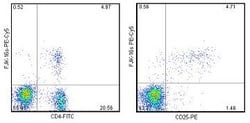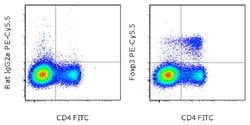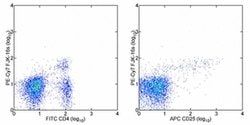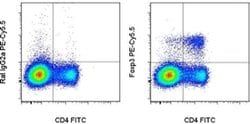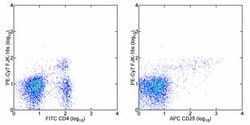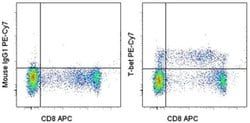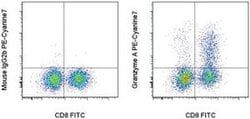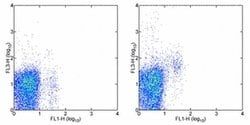FOXP3 Monoclonal Antibody (FJK-16s), PE-Cyanine7, eBioscience™, Invitrogen™
Rat Monoclonal Antibody
Manufacturer: Fischer Scientific
The price for this product is unavailable. Please request a quote
Antigen
FOXP3
Concentration
0.2 mg/mL
Classification
Monoclonal
Form
Liquid
Regulatory Status
RUO
Formulation
PBS with 0.09% sodium azide; pH 7.2
Gene Alias
AIID; DIETER; forkhead box P3; forkhead box protein P3; Forkhead box protein P3 41 kDa form; Forkhead box protein P3, C-terminally processed; forkhead/winged helix transcription factor 3; Foxp3; FOXP3delta7; immune dysregulation, polyendocrinopathy, enteropathy, X-linked; immunodeficiency, polyendocrinopathy, enteropathy, X-linked; IPEX; JM2; MGC141961; MGC141963; PIDX; regulatory protein Foxp3; RGD1562112; RP23-54C14.1; scurfin; scurfy; sf; XPID
Gene Symbols
Foxp3
Primary or Secondary
Primary
Content And Storage
4° C, store in dark, DO NOT FREEZE!
Gene
Foxp3
Clone
FJK-16s
Applications
Flow Cytometry
Conjugate
PE-Cyanine7
Host Species
Rat
Target Species
Bovine, Canine, Feline, Mouse, Porcine, Rat
Gene Accession No.
Q99JB6
Gene ID (Entrez)
100037405, 20371, 317382, 444998, 491876, 506053
Isotype
IgG2a κ
Purification Method
Affinity chromatography
Product Type
Antibody
Description
- Description: The FJK-16s antibody reacts with mouse, rat, dog, porcine, bovine and cat Foxp3 also known as FORKHEAD BOX P3, SCURFIN, and JM2; cross reactivity of this antibody to other proteins has not been determined
- Foxp3, a 49-55 kDa protein, is a member of the forkhead/winged-helix family of transcriptional regulators, and was identified as the gene defective in 'scurfy' (sf) mice
- Constitutive high expression of foxP3 mRNA has been shown in CD4+CD25+ regulatory T cells (Treg cells), and ectopic expression of foxp3 in CD4+CD25- cells imparts a Treg phenotype in these cells
- Immunoblotting with FJK-16s antibody has mapped the epitope to amino acids 75-125 of the mouse Foxp3 protein
- In the human, this region has been shown to be alternatively spliced at the mRNA level
- Both the alternatively-spliced and non-spliced isoforms are present in the CD4+CD25+ subset of lymphocytes
- Preliminary RT-PCR experiments have not revealed this alternatively-spliced isoform in mouse splenocytes, suggesting different gene regulation in the mouse and human
- Please note that FJK-16s has been optimized for use with the Foxp3/Transcription Factor Buffer Staining Set (cat
- 00-5523)
- The use of other fixation and staining buffers is not recommended
- Applications Reported: This FJK-16s antibody has been reported for use in intracellular staining followed by flow cytometric analysis
- FOXP3 (Forkhead box protein 3) is a member of the forkhead/winged-helix family of transcriptional regulators, highly conserved across mammals, and essential for normal immune homeostasis
- FOXP3 is 381 amino acids long, stably and constitutively expressed at a high level in CD25 + CD4 positive regulatory T cells, a low level in CD4-positive/CD25-negative cells, and is absent in CD4-negative/CD8-positive T cells
- FOXP3 may be a master regulatory gene, and a more specific marker of regulatory T cells
- Defects in the gene encoding FOXP3 protein cause the scurfy phenotype in mice
- In humans FOXP3 defects play a role in IPEX syndrome (immune dysfunction, polyendocrinopathy, enteropathy, X-linked syndrome), also known as X-linked autoimmunity-allergic dysregulation (XLAAD) syndrome
- Transcript variants of FOXP3 encoding different isoforms have been identified
- In human breast and colon cancer cells, expression of FOXP3 is regulated by p53 in response to the DNA damage.
